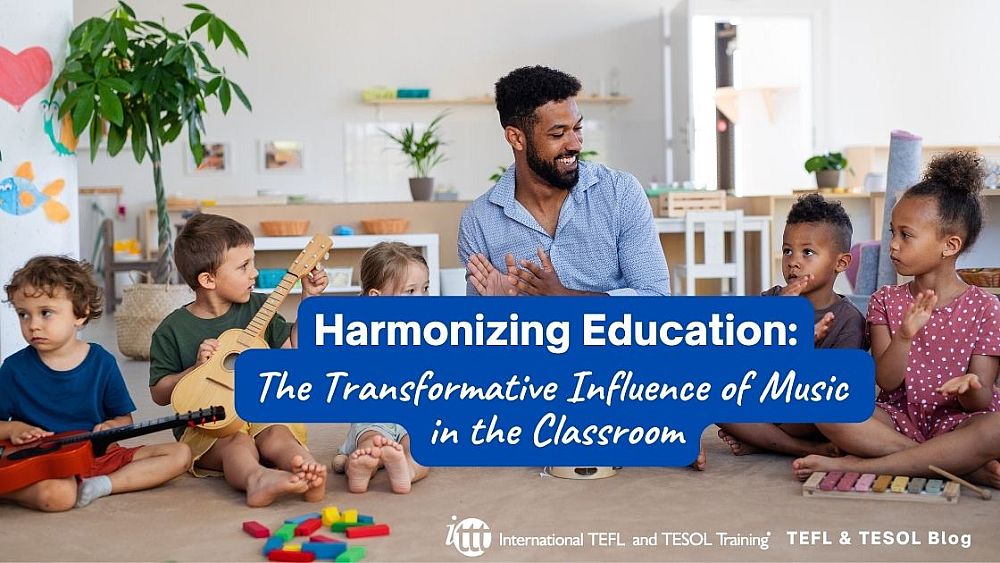Harmonizing Education: The Transformative Influence of Music in the Classroom

Memorable and Engaging We all know familiar songs that we likely learned in our childhood. Though we may not remember when or where we first heard most songs, they often stay with us for years, decades, even our entire lives! Why is music so memorable, and how can we use it to aid in teaching a classroom? Learning through song has so many benefits we can and should utilize!
Table of Contents
Are you ready to teach English as a foreign language?
Check out what our course grads say in our many video testimonials!
Emotional Impact
Encouraging Joy and Engagement Music has the obvious ability to change one's mood and evoke emotion. Wherever music is applied, it draws expression, whether in joy or sadness. If we can use it to encourage joy in a classroom, students will be more enthusiastic about coming to class ready to learn! A song can't be sung without a natural flow of tone, pitch, and rhythm. Of course, this is more dynamic than simply speaking, and thus more interesting and engaging. Many songs, especially those taught to young children, are accompanied by motions, which involves one's entire body in learning. Physically engaging with music also increases energy in the classroom. Young children in particular can find music to be amusing and will likely find enjoyment in participating where music is involved. According to the Florida National University, music is also shown to reduce stress and ease emotion. Much of learning is affected by our mental and emotional state, so what better way to go into a learning environment than to be at ease?
The Universal Language
Connecting People Few things are universal quite like music. Music has a way of connecting people unlike anything else. There are always differences in people, especially in a classroom where a second language is being taught, as there are obviously going to be many cultural differences. Music can act as a bridge to bring commonality. It connects people. As said before, music evokes emotion. Regardless of race, country, or culture, as humans, we all experience the same emotions. Many songs are known widely across the world and in different countries. Even if specific songs are not known in multiple countries, much like math and scientific laws, music follows patterns and rules all around the world, and whether one has studied music or not, these things are simply, albeit unconsciously, understood and recognized. In an ESL classroom specifically, music can build relationships between teacher and students where there may be few other commonalities. Trust and connection in a classroom will naturally bring out better performance and interest from the students.
Music and Brain Function
Enhancing Learning and Memory Many studies have been done on how music affects learning and retention of information. Florida National University has studied and observed that music can improve performance and brain function. This is likely due to what Vaughn College has stated, which is that music engages both sides of the brain at once. Because of this, music also increases the ability to recall memories, as it connects experiences and emotions. Harvard University has also concluded that music not only helps retrieve old memories but makes new ones. In a learning environment, storing information learned and being able to recall such information is crucial to growth. Music also deals with patterns, which our minds naturally follow, thus increasing retention of information set to music.
A Lasting Impact
Utilizing Music in the Classroom The benefits of music are vast, and the connection between music and academics is still being studied to discover to what extent it can help in learning! Whether in information put to song or listening to music while studying, music is shown to improve brain function. As seen in both young children and older adults, music evokes emotion, connects learners and teachers alike, and is known to aid in memory recollection. It is obvious that music is a tool that can and should be used in the classroom to enhance the learning experience. The applications of music are numerous, and the effects are lasting. Music has and will continue to benefit people of all nationalities, ages, and academic abilities!
Are you ready to teach English as a foreign language?
Apply now & get certified to teach english abroad!
Speak with an ITTT advisor today to put together your personal plan for teaching English abroad!
Send us an email or call us toll-free at 1-800-490-0531 to speak with an ITTT advisor today.
Related Articles:
- Top 10 Cities in Europe with the Highest Demand for English Language Teachers
- 5 Reasons To Take A TEFL Course Right Now - Even If You Are Not Leaving Yet | ITTT | TEFL Blog
- All the Documents You Will Need to Teach English Abroad
- The Impact of Positive Motivation on an ESL Classroom
- You're Never Too Old to Change Your Life and Do a TEFL Course | ITTT | TEFL Blog
- Getting Student Placement Right - The Best Desk Arrangements for EFL Students



